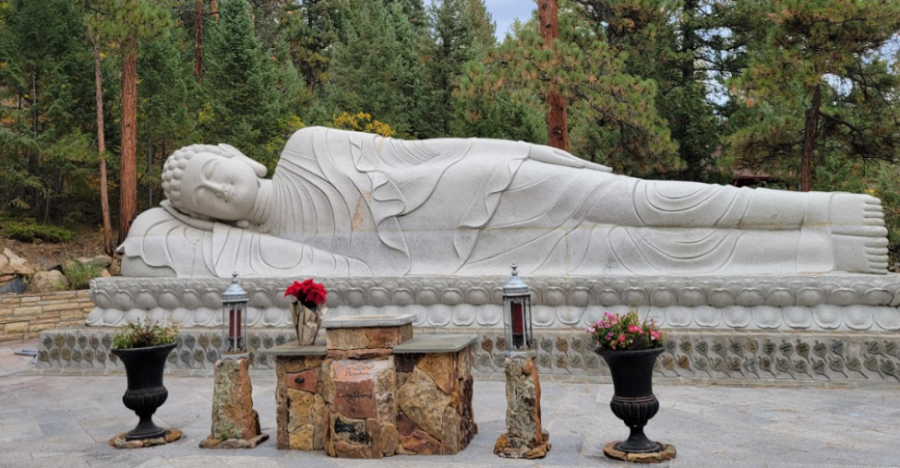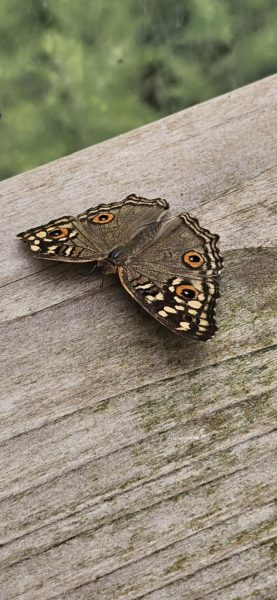Modern Buddhists and Mindfulness
Many college students have struggled with mental health since the pandemic and there may be unexplored treatments in the hills of Colorado.
Image via Shelby Whiteaker
A photo of a statue onsite at the Compassionate Dharma Cloud Monastery.
Tu Viện Tù Vân
A breeze rustles the pines outside of a Bhuddist temple. White statues of the Buddha stand watch through the trees, towering over the paths and buildings. A group of followers wait in silence for their teacher to show them the way on a mindfulness walk. Off in the distance, the sounds of U.S. Highway 285 and its morning traffic drown out the birdsong of the morning.
Wait, traffic? Highways?
That’s right. The temple is not in the mountains of Vietnam, or in the cities of Cambodia, but in Morrison. Just 14 miles from ACC’s Littleton campus.
This particular monastery is called Tu Viện Tù Vân, or the English name, Compassionate Dharma Cloud Monastery. Established by head teacher Abbot Tinh Man in 2006, and just off of Highway 285, this monastery displays gorgeous gardens, pathways, statues, and even a new meditation hall. The monastery also fosters four types of Buddhism according to the website. This includes Engaged Buddhism, Pureland, Zen, and Meditation Buddhism.
But why are things like this so important to keep in mind in 2022?
A scientific journal published by the Multidisciplinary Digital Publishing Institute (MDPI) in 2022 found that since the 2020 COVID outbreak, the mental health of college students has been in sharp decline.
The article states that “Since the mid-2000s, diagnoses of psychological disorders, such as anxiety and depression, among post-secondary students have been on the rise in modern societies… leading experts to call attention to a mental health crisis in the college student population.”
Many students themselves are already aware of the ongoing problem, but solutions can be less easy to grasp. Medications, exercise, and therapy all have been routes regularly traveled, but sometimes, they just don’t do the trick.
The same article found that oftentimes, when using medical terms such as ‘diagnoses’ or ‘disorder’ the inference is made that the afflictions are strictly ‘psychiatric’. In fact, the researchers found that the afflictions were often more closely connected to ‘identity and purpose,’ and as a result, should explore alternative routes to improvement.
There is hope yet. Buddhism, among other mindful practices, can possibly help alleviate some of the stressors placed onto college students. While there are many different types of mindfulness practices and pathways, the fact remains that mindfulness originates from Buddhism, and has been transformed to fit modern societies needs.
Abbot Tinh Man, a teacher at the CDCM states that there are so many benefits one can find in practicing Buddhism. Destressing the body and the mind, among other things.
The article also comes to the conclusion that following a mindful path similar to that of Buddhist teachings may prove more effective in addressing the problems that students are facing, seeing as how many of these problems are “existential in nature and not medical.”
Buddhism is not a final solution to any problems, and it’s likely that nothing ever will be. However, for those feeling overwhelmed, stressed, or simply wanting to connect with something new, mindfulness practices may help.
The engaged buddhism taught at the CDCM is an opportunity for newcomers and returners alike to share a space and cultivate their own mindfulness practices. Teacher Tinh Man explains the importance of having both engaged and traditional Buddhism in a shared public space such as this one.
“The traditional Buddhism they focus more on the monastic setting… it does not have a chance to go into society… More practice, more enlightenment. For the monastics more than for society,” Tinh Man said.
An idea that could be concerning for those not willing to sacrifice societal attachment for enlightenment.
“But Engaged Buddhism, they’re involved into today’s like, human rights, environment protection, new development, technologies, and gender rights… They bring the teachings of the Buddha into society and apply it to the problems. The human problems,” says Tinh Man.
A moment of relief for followers who want the benefits of Buddhism without the social isolation.
When asked what newcomers should think when exploring the paths of Buddhism, Tinh Man explained that “They have to come and experience… If you meet the right teachers who have really practiced and we share the, whatever, practical practice that you can apply everyday life. Build up your confidence, your relaxations, your strength.”
While this path is not a complete fix to all the problems people of Colorado may have in a post-COVID world, it could be worth a shot. Just a short drive up 285 and one could find themselves at peace with their surroundings and place.













